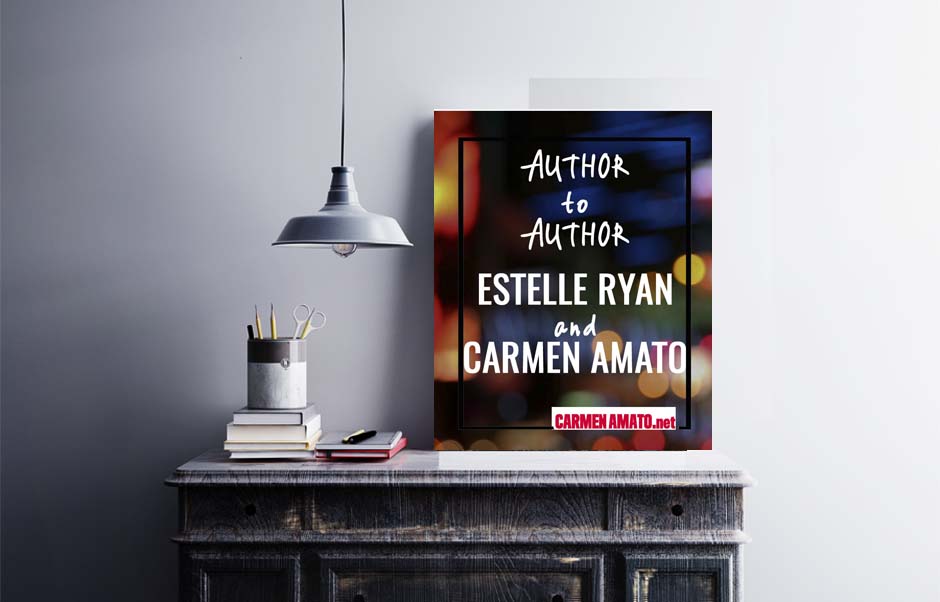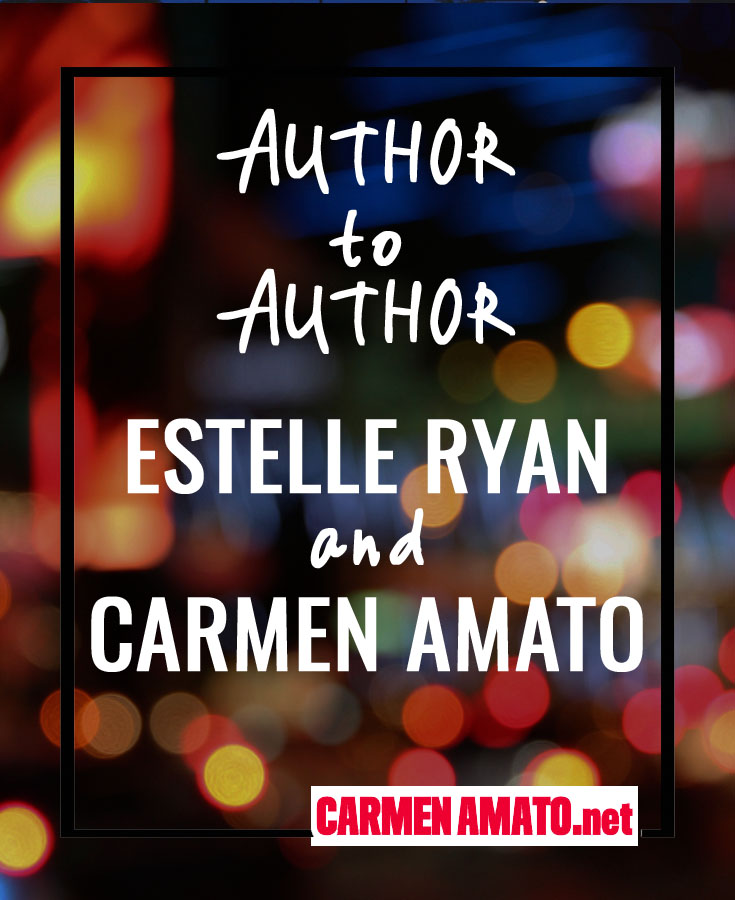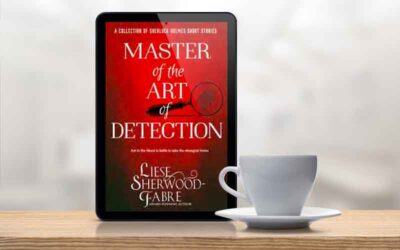I had the pleasure of meeting Liese Sherwood-Fabre when we were fellow panel members at a mystery...

Author to Author with Estelle Ryan
I’ve been reading Estelle Ryan’s Dr. Genevieve Lenard mystery series, starting with THE GAUGUIN CONNECTION. The series is a fresh take on the usual whodunit, both in terms of style and characters. I’m delighted to host Estelle today for a short chat.
Carmen Amato: Estelle, your absolutely compelling mystery series featuring Dr. Genevieve Lenard now spans 9 novels. Dr. Lenard is a self-described “non-neurotypical” personality with touches of Asperger’s Syndrome and Obsessive Compulsive Disorder in her makeup, all of which both help and hinder her efforts to solve crimes that incorporate an art element. Between the complexity of the character and the mysteries solved, how do you maintain continuity across the series while also keeping things fresh?
 Estelle Ryan: Firstly, thank you so much for having me and also for your kind words. When I developed the series, I spent a lot of time getting to know my characters before I even wrote the first book. I wrote out comprehensive personality and professional profiles on each of them. No matter what crazy crime challenge gets thrown their way or how much each of them grow throughout the series, at their core they’re still true to their personalities. Plot points are easy and hard to find. Technology evolves at such an alarming rate, it’s not difficult to find new things to include in the mysteries. The difficult part comes in avoiding the very strong temptation of repeating the progression of a mystery in one of the previous books. But that challenge is fun to take on.
Estelle Ryan: Firstly, thank you so much for having me and also for your kind words. When I developed the series, I spent a lot of time getting to know my characters before I even wrote the first book. I wrote out comprehensive personality and professional profiles on each of them. No matter what crazy crime challenge gets thrown their way or how much each of them grow throughout the series, at their core they’re still true to their personalities. Plot points are easy and hard to find. Technology evolves at such an alarming rate, it’s not difficult to find new things to include in the mysteries. The difficult part comes in avoiding the very strong temptation of repeating the progression of a mystery in one of the previous books. But that challenge is fun to take on.
CA: Accompanied by her observations of body language, discussions between a group of characters in Genevieve’s apartment or her work place drive much of the storyline in your books. What are the pros and cons of so much dialogue?
ER: The pros of dialogue-heavy story telling are numerous, one of which is that it is more dynamic. It gives the reader the opportunity to get to know the characters through their speech and not through lengthy descriptions. It is a great way to reveal conflict between characters as well as giving each character a very distinct voice. The cons would be the lack of detailed description. We are venturing into a very subjective topic. Some readers love detailed descriptions of places, emotions, actions, as well as lengthy internal dialogue, where others find that boring and skip over those parts. Both have their place and finding a balance is another challenge for every writer.
CA: One of the reasons I love your books is that our writing styles are very similar. We both feature strong yet flawed female characters and write from their deep point of view. What is the most difficult thing you have faced writing the character of Dr. Genevieve Lenard?
ER: I wanted the readers to experience the challenges people on the spectrum face every day. I wanted to make Genevieve difficult, but I didn’t want to make her impossible to relate to or unlikable. Striking that balance has been and still is something I pay close attention to. People who don’t know someone on the spectrum might find a character like Genevieve unbelievable and it’s my job to draw them into her world, into her mind in a way they can relate to her – even if it’s only in a small way.
CA: I found Genevieve to be very relatable! Part of what makes her endearing is that she struggles with all the changes in her life, but never loses that well-crafted and unique persona.
Transition is a huge part of a mystery or thriller novel. Change amps up tension and forces characters to adapt in order to keep moving forward. Can you share a significant transition that you experienced or that you wrote for a character?
 ER: The catalyst for Genevieve’s most significant growth/transition was when Colin and the other friends entered her life in the first book. She was forced out of her comfort zone of isolation and had to learn to trust and share. Adding the presence of Nikki, the student who elicits very strong protective tendencies in Genevieve also shook her to her core. I think all of us have experienced such events that took us to uncharted emotional territories and forced us to grow and often face our own fears.
ER: The catalyst for Genevieve’s most significant growth/transition was when Colin and the other friends entered her life in the first book. She was forced out of her comfort zone of isolation and had to learn to trust and share. Adding the presence of Nikki, the student who elicits very strong protective tendencies in Genevieve also shook her to her core. I think all of us have experienced such events that took us to uncharted emotional territories and forced us to grow and often face our own fears.
CA: Can you leave us with a quote, a place, or a concept from a book that inspired you?
ER: Everything about ‘To Kill a Mockingbird’ touched me. This quote is something I hold dear: “You never really understand a person until you consider things from his point of view … until you climb into his skin and walk around in it.”
Estelle, thank you for stopping by!
If you haven’t read the terrific Dr. Genevieve Lenard series yet, check out Estelle’s website and find the Dr. Genevieve Lenard books on Amazon
You may also like
Author to Author with Liese Sherwood-Fabre
Best Books to Read According to Contest Judges (and me!)
Today I’m sharing 9 books by friends of the Mystery Ahead newsletter (and 1 by yours truly) that...
Elections This Year are the Stuff of Fiction
In BARRACUDA BAY, the upcoming Detective Emilia Cruz mystery set in Acapulco, elections for mayor...

CARMEN AMATO
Mystery and thriller author. Retired Central Intelligence Agency intel officer. Dog mom to Hazel and Dutch. Recovering Italian handbag addict.




